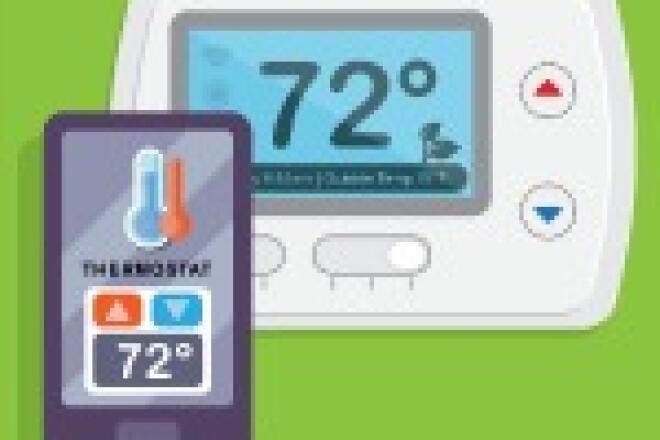
Myths vs. Facts: The Truth about Smart Meters
Misunderstanding advanced technology can lead to the emergence of urban legends. The case is no different with smart meters, which utilities are rolling out across the country in an effort to bring the benefits of a modernized electric grid to consumers like you.
The following are the most commonly circulated smart meter myths. Our responses, each supported by research, offer the facts — the real deal on smart meters.
MYTH #1: Smart meters are less accurate than analog meters
TRUTH: Smart meters are rigorously tested for accuracy even before they leave the manufacturing plant.
TRUTH: Some public service commissions require meter manufacturers to supply test results to prove that their smart meters generate on-the-mark measurements. All meter manufacturers must follow performance standards set by the American National Standards Institute.
TRUTH: Prior to installation, utilities repeatedly perform accuracy tests, often side-by-side with analog meters.
Repeated tests confirm that smart meters are accurate, in some cases even more accurate than analog meters.
MYTH #2: Smart meters are a health threat because they communicate using wireless signals.
TRUTH: In-depth review of the scientific literature by the World Health Organization (WHO) revealed that the small amount of radio frequency (RF) energy produced by smart meters is not harmful to human health.
TRUTH: RF emitted by smart meters is well below the limits set by Federal Communications Commission and it is below levels produced by other common household devices like cell phones, baby monitors, satellite TVs, and microwaves. In fact, you would have to be exposed to the RF from a smart meter for 375 years to get a dose equivalent to that of one year of 15-minutes-per-day cell phone use.
No credible evidence shows any threat to human health from RF emissions at or below RF exposure limits developed by the FCC. With over 25,000 articles published on the topic over the last 30 years, scientific knowledge in this area is now more extensive than for most chemicals.
MYTH #3: Smart meters will not keep my data secure.
TRUTH: Just as the banking, credit card and cable industries have provided secure access to your information online, the utility industry is poised to do the same using advanced security and encryption technology to safeguard your data.
TRUTH: Utilities are involved in national consortiums and work with national cyber-security to regularly audit their systems to ensure privacy and security of smart meters.
The privacy of your data is protected now. Utilities work constantly to safeguard it. That will not change with the use of smart meters.
MYTH #4: Smart meters are hazardous, increasing the risk of fire and explosion.
TRUTH: Smart meters must meet safety requirements and standards spelled out in the National Electric Safety Code (NESC).
TRUTH: Public service commissions require independent certification proving that smart meters are safe and show resistance to heat, fire, voltages, surges, and self-heating.
Companies that manufacture smart meters produce certifiably safe and reliable equipment. Nevertheless, smart meters should be installed and uninstalled only by trained professionals exercising standard safety precautions.
MYTH #5: Smart meters are an invasion of privacy.
TRUTH: Smart meters measure how much energy you use, based on time of day, not how you use that energy. Unless you install a home energy management system, smart meters cannot tell whether the energy used is from your oven, air conditioner, or hairdryer.
TRUTH: Utilities adhere to strict policies, following state laws that regulate the use of personal information for business functions like billing and customer service.
Smart meters are a landmark change allowing two-way communication between your utility and you, much like cell phones and banking. Utilities keep your data private and secure, similar to those industries and similar to how it’s always been.
MYTH #6: Smart meters do not provide any consumer benefits.
TRUTH: Smart meters measure and transmit your energy usage directly to your utility, eliminating the practice of estimated bills, which means no more surprises on your electric bill.
TRUTH: Smart meters provide you with near-real time energy usage information about how much, when and in some cases, at what price, you use energy. Armed with this information, you can take more control over your energy consumption—and your monthly bills.
TRUTH: Working as a part of the smart grid, smart meters improve power outage detection and notification. Smart meters electronically report the location of outages before you ever have to call your utility, making restoration faster and status notification to you much easier.
Greater reliability, faster power restoration, convenience, and control are just a few of the many benefits of smart meters.
Separating myths from reality allows you to take advantage of all the benefits that a smarter, more modernized electric grid offers. It’s important to stay informed and learn about the different ways your utility is deploying smart grid and smart meters to improve their electric service. For trusted information about smart grid and smart meters visit the US Department of Energy at SmartGrid.gov or your utility website.
Download this fact sheet.
Watch the video.



